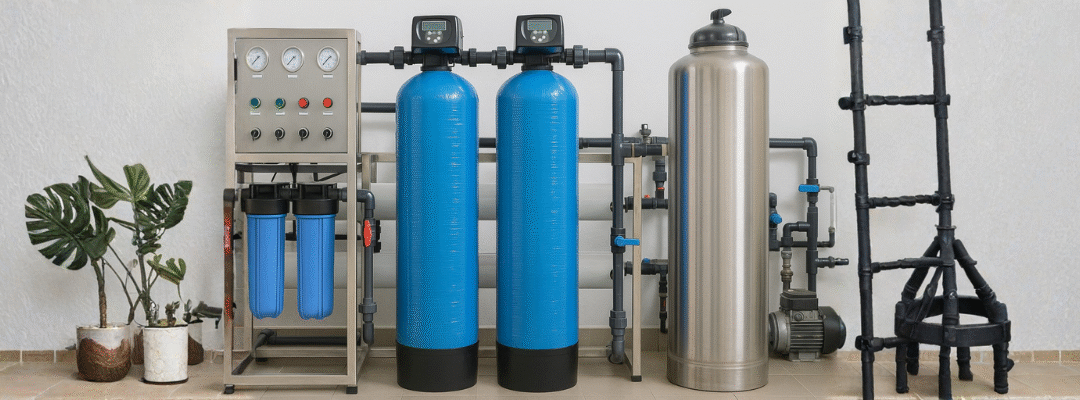Setting up an RO (Reverse Osmosis) Water Plant in India is a promising venture — whether you aim to provide packaged drinking water, process water for industries, or purification services for commercial facilities.
However, beyond the technical setup, navigating the government approval process is critical. Proper licenses ensure legal compliance, public safety, and smooth operations.
Why Government Approvals Are Crucial
This guide breaks down all essential government certifications, licensing requirements, and pro tips to help you launch your RO plant without delays.
Government approvals are necessary to:
- Ensure water safety and quality as per BIS and FSSAI standards
- Comply with environmental norms and local regulations
- Avoid shutdowns, legal penalties, or brand credibility issues
- Build consumer trust with verified certifications
Operating without proper licenses can lead to prosecution under BIS, FSSAI, and Environmental Acts.
Categories of RO Water Plants and Approval Needs
| Type of RO Plant | Usage Purpose | Key Approvals Required |
|---|---|---|
| Packaged Drinking Water | Bottled water for retail | BIS, FSSAI, Pollution Control, MSME, GST |
| Industrial RO Plant | Process/Utility water for factories | PCB, Factory License, MSME |
| Commercial RO System | Schools, hotels, clinics | Municipal, Health Department |
| Community RO Plant | Rural or public drinking water | NABL testing, PHED, Local Authority |
Mandatory Licenses and Approvals
BIS Certification (ISI Mark)
Authority: Bureau of Indian Standards
Required For: Packaged drinking water (IS 14543) and mineral water (IS 13428) plants
Purpose: Certifies water quality, safety, and packaging standards
Documents Required:
- NABL water test report
- Plant layout, source water details
- Ownership/lease proof of premises
Validity: 2 years (renewable)
FSSAI License
Authority: Food Safety and Standards Authority of India
Required For: Bottled water plants and brands
Documents Required:
- BIS certificate
- Lab reports
- GST/Business registration
- Source and process flow diagram
License Type: FSSAI Central License (1–5 years)
Pollution Control Board (SPCB) Consent
Authority: State Pollution Control Board (SPCB)
Required For: All commercial and industrial RO plants
Two-Stage Consent:
- CTE (Consent to Establish)
- CTO (Consent to Operate)
Documents Needed:
- Effluent treatment plan
- Wastewater disposal method
- Site plan and process details
Note: Brine disposal must follow Water Act 1974 guidelines.
Local Municipal / Health Department Approval
Authority: Municipality or Gram Panchayat
Required For: Urban, commercial, and community RO setups
Approvals Include:
- Trade License
- Sanitation NOC
- Fire Department NOC (if applicable)
NABL Water Testing Certificate
Authority: NABL-accredited lab
Required For: All plant types
Test Parameters: TDS, hardness, microbial count, pH, metals
Frequency: Every 3 months
MSME / UDYAM Registration
Authority: Ministry of MSME
Benefits:
- Access to government tenders
- Easier bank loans
- Electricity concessions
Documents Needed:
- Aadhar, PAN, address proof
- Machinery details
GST Registration
Authority: GST Department
Required For: Businesses with turnover > ₹20 lakh/year
Optional but Useful Certifications
| Approval | Authority | Purpose |
| Groundwater Extraction NOC | CGWA | Required if using borewell or tube wells |
| ISO 9001 / 14001 | Private Certifying Bodies | Quality & Environmental management |
| Fire & Safety NOC | Fire Department | Mandatory for plants above 500 sq.m. area |
| Electricity Board Clearance | State EB | High HP motor installation approval |
Step-by-Step Licensing Timeline
Step 1: Conduct NABL-certified water testing
Step 2: Prepare project report and plant layout
Step 3: Apply for Pollution Board’s CTE
Step 4: After setup, apply for BIS certification
Step 5: Obtain FSSAI license (if selling bottled water)
Step 6: Get local licenses (trade, sanitation, fire)
Step 7: Register under MSME and GST
Step 8: Begin trial runs and third-party water testing
Timelines & Estimated Costs
| License/Approval | Timeline | Estimated Cost |
| BIS Certification | 30–45 days | ₹25,000 – ₹1,00,000 |
| FSSAI License | 15–30 days | ₹5,000 – ₹15,000 |
| Pollution Board CTE/CTO | 30–60 days | ₹10,000 – ₹25,000 |
| Trade License | 10–15 days | ₹2,000 – ₹5,000 |
| NABL Water Testing | 5–10 days | ₹2,000 – ₹10,000 |
Note: Prices vary by state and plant size.
Compliance Checklist
Keep these updated regularly:
- Quarterly NABL test results
- Effluent and discharge logbook
- Membrane maintenance records
- Calibration certificates
- License renewal reminders
FAQs
Q1. Is BIS certification required for industrial RO plants?
No. BIS is mandatory only for packaged drinking water brands.
Q2. Can I sell bottled water without an FSSAI license?
No. You must get an FSSAI Central License before selling.
Q3. How frequently must water be tested?
Every 3 months from an NABL-accredited lab.
Q4. Do small RO plants need Pollution Board consent?
Yes. CTE and CTO are mandatory for all plant sizes.
Q5. What if my water fails quality tests?
Pause production, identify root cause, retest after corrective action.



Recent Comments